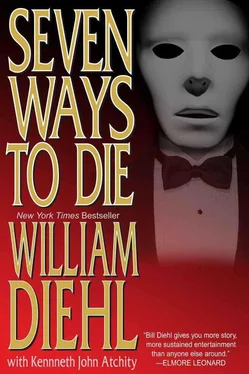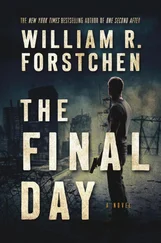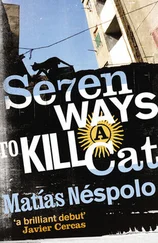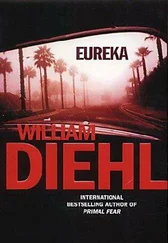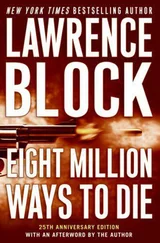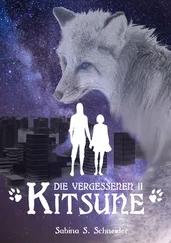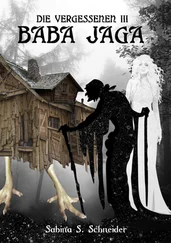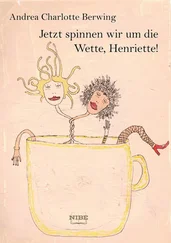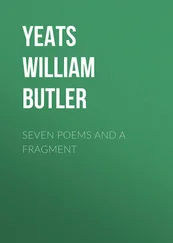William Diehl - Seven ways to die
Здесь есть возможность читать онлайн «William Diehl - Seven ways to die» весь текст электронной книги совершенно бесплатно (целиком полную версию без сокращений). В некоторых случаях можно слушать аудио, скачать через торрент в формате fb2 и присутствует краткое содержание. Жанр: Триллер, на английском языке. Описание произведения, (предисловие) а так же отзывы посетителей доступны на портале библиотеки ЛибКат.
- Название:Seven ways to die
- Автор:
- Жанр:
- Год:неизвестен
- ISBN:нет данных
- Рейтинг книги:5 / 5. Голосов: 1
-
Избранное:Добавить в избранное
- Отзывы:
-
Ваша оценка:
- 100
- 1
- 2
- 3
- 4
- 5
Seven ways to die: краткое содержание, описание и аннотация
Предлагаем к чтению аннотацию, описание, краткое содержание или предисловие (зависит от того, что написал сам автор книги «Seven ways to die»). Если вы не нашли необходимую информацию о книге — напишите в комментариях, мы постараемся отыскать её.
Seven ways to die — читать онлайн бесплатно полную книгу (весь текст) целиком
Ниже представлен текст книги, разбитый по страницам. Система сохранения места последней прочитанной страницы, позволяет с удобством читать онлайн бесплатно книгу «Seven ways to die», без необходимости каждый раз заново искать на чём Вы остановились. Поставьте закладку, и сможете в любой момент перейти на страницу, на которой закончили чтение.
Интервал:
Закладка:
William Diehl
Seven ways to die
1
Idaho-nez Perce reservation
The Boy was lost. But that was as it should be. It was part of the challenge. He stared out over the mountains and thought about what his father and the qiwn, the Old Man with Wisdom, had taught him.
His entire journey would rely on the lessons of qiwn; things he had been listening to, and learning from, since he was old enough to understand Nimiputimptki, the language of the Nez Perce. And the Old Man had been talking to him since he was in his mother’s arms, before the other elders had also passed on their knowledge, before his father returned from the service.
It was Old Man who had called him Hemene Ka-Wan, at a Name Giving Ceremony before he was old enough to walk. In American it meant Youngest Wolf and was the name of the first star in the handle of the Big Dipper which gave The Boy a mystical connection to the sky. And later, when one of the miyooxat, the religious leaders of the tribe, had seen four eagles circling over The Boy’s head, he had pronounced that Ka-Wan was blessed with Weyekin.
When he was six or seven, he asked Old Man what Weyekin meant.
Old Man just looked him in the eye. “Listen,” Old Man had said, pointing two fingers at his own eyes. “Always look at the creature who speaks to you.”
Once he was going to his grandma’s house with a rabbit he had killed for stew. It was dusk and he heard an owl in the trees and he stopped and listened and then saw the owl and looked at it in the eyes.
“Oo, oo, whoee,” it said and he mimicked it. He stood for several minutes repeating the sound of the owl and when he went inside he told his grandmother about the owl and the sound it made.
She cocked her head to one side and listened to him and then said, “It will rain soon. Tomorrow night.”
“All creatures talk to each other,” Old Man said. “The wolf howls one way and it means one thing, he howls another way and it means something else. So does the eagle and the coyote and all creatures.”
“Oh.”
“Just like people.”
Now he was in his thirteenth year. Now he would take the walk to manhood, a decision he alone had made. It was not a tradition practiced by young Nez Perce anymore so he had depended on Old Man to tell him how it worked; to describe the passage so he would do it properly.
He was dressed properly for the trek: Buckskin leggings and shirt made by his mother and grandma; his father’s gray hat which had a broad band and low, flat crown; new moccasins; and a blanket which his grandma had meticulously woven for him years before and which had served him well. His mother had braided his long, black hair into a tight ponytail.
He himself had made the bow and eight arrows with which he would hunt when he got hungry. His canteen had been his father’s in the army. His hunting knife was a birthday gift from Old Man when he was eight although his mother had felt he was too young for such a weapon.
But his father had over-ruled her and taught him how to skin an animal properly and how to throw the knife so it always stuck what he was aiming at and how to sharpen it.
“A dull knife’s about as good as a broken leg,” he told The Boy.
They were the good years before his father fell sick from the Orange Rain. His father followed the way of the Nimiipu and believed in the walabsat, the Seven Drum Religion, but he was also a Christian and went to the Catholic church with his mother. Sometimes it confused The Boy.
One night, after they had been in a sweat house, they were lying in the grass by a stream cooling down and The Boy was staring up at the stars.
Finally his father said, “You have a strong heart, Ka-Wan. You’re learning the way of our people. That was your choice and I’m very proud of you for taking the path.”
The Boy felt good about that.
When his father was too sick to do anything but huddle in his blanket on the back porch and stare into the mountains, The Boy would sit beside him dancing and singing songs he learned from the Seven Drummers, then saying a prayer that his father would get well.?
The plan was simple. The Boy and Old Man left on horseback at first light. The Boy could take only the essentials: Water, his blanket, weapons, some flint, and some medicines his grandma, who was a medicine woman, made from mother earth, from the black moss on trees and from herbs and roots which were to purify wounds or injuries if he got hurt. No food or maps. No matches. And he was blindfolded. Old Man led him up into the mountains and away from the trails.
As sunset approached they stopped near a stream and Old Man removed the blindfold. They cut the poles for a good luck wistitamo and they gathered rocks and built the fire. After the sweat house, they jumped into the stream for a few moments to wash off the sweat then wrapped themselves in their blankets. They removed the canvas and poles and Old Man cooked a meal over the fire. A stew, then some venison and finally berries, each chopped in half. They drank a lot of water.
Old Man sang a prayer for his safe passage and they went to sleep.
When he awoke, the sun was peeking over the mountain top and Old Man was gone. He had left one thing for good luck, an ‘ipetes, an eagle’s feather, which Old Man fastened to the back of the crown of his hat. He had also left the pot of uneaten stew, the rest of the venison and berries, the canvas sweat house tarp.
The Boy found a strong branch to use as a walking stick. Each morning when he woke up he would cut a notch in the handle to keep track of the days.?
He found a stick and drew a straight line through the shadow. Then he stood and looked straight down the shadow. Southwest, he thought. Then he heard a sharp screech and looked up and saw a bald eagle circling him. It was talking to him, telling him to follow the line. Then it flew off straight southwest.
“Thank you, brother eagle,” he said, gathering his meager belongings, wrapping them in his blanket, and following the eagle’s trail. He was halfway down a mountainside which still had some late spring snow capping it. He trotted through the thick woods and late in the day came to a snow stream tumbling down from the peaks. He drank the cold clear water and filled his canteen and then hopped across the stream and followed it down until he came to a boulder etched out of the mountainside. It would be a safe place to sleep, there above the stream which was widening as the snow melted.
The Boy gathered handfuls of thick pine branches and made a mattress on the flat rock. Then he bunched up a small pile of leaves a few yards away and, using his flint, struck fire into the leaves and made a small temple of sticks above the meager fire and blew softly on it until the sticks started to burn. By the time the sun slipped behind the mountains he had a good fire going. He finished off the last of the food Old Man had left him, wrapped himself in his blanket and lay down on the pine mattress.
Listen. The past will become the present and the future will unfold before your eyes. Sometimes when you are alone it is okay to think about what has gone before. In your life, I mean. To understand why the past has become the present. Sometimes it is okay to think about where the trail will lead you, and why you are following it at all.
He was hungry and needed sleep to restore his energy. His food was gone.
Tomorrow he would have to go hunting.?
He was awakened before dawn by an owl. He lay huddled in his blanket and listened as owl spoke to him from the dark. His eyesight was keen, so that people said he saw in the dark. He could see the owl as clearly as he could hear it.
“Oo oo whoee. Oo oo whoee.”
It was going to rain. During the coming night.
Читать дальшеИнтервал:
Закладка:
Похожие книги на «Seven ways to die»
Представляем Вашему вниманию похожие книги на «Seven ways to die» списком для выбора. Мы отобрали схожую по названию и смыслу литературу в надежде предоставить читателям больше вариантов отыскать новые, интересные, ещё непрочитанные произведения.
Обсуждение, отзывы о книге «Seven ways to die» и просто собственные мнения читателей. Оставьте ваши комментарии, напишите, что Вы думаете о произведении, его смысле или главных героях. Укажите что конкретно понравилось, а что нет, и почему Вы так считаете.
